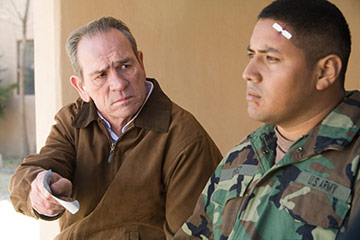
Paul Haggis isn’t exactly a subtle filmmaker.
As a screenwriter, his work tends not only toward the melodramatic, but also the manipulative and downright maudlin (Flags of Our Fathers, Million Dollar Baby and The Last Kiss are among the scripts he’s written).
As a director, he’s best known for Crash, which tackled the thorny issue of racism in modern America by focusing on an ensemble of racist characters, and then setting them up against one another in increasingly unlikely coincidences. The message? Racism is bad, and we really oughta cut that stuff out.
With In The Valley of Elah, Haggis tackles another thorny issue, this one just as explosive, but more specific to this time: The war in Iraq.
Oh boy.
It’s true that documentarians really seem to have this issue covered, as the just recently arrived No End In Sight proves, but Haggis bravely, if clumsily, focuses on the soldiers themselves, the cost of war-fighting on them, and the cost to the society. It helps that he frames things as narrowly as he does, though it’s frustrating that he can’t keep his focus on telling a story and implying a message instead of giving a lecture about how messed up the war is, and that we rely on our bravest young people to fight it for us.
Tommy Lee Jones plays Hank Deerfield, a retired career officer with Military Police experience, whoe son has just returned from Iraq and gone AWOL. Hank travels to Fort Rudd and joins the search for his son, which soon turns into a murder mystery. As a straight police procedural, the film works quite well, the occasionally clichéd elements made fresh by the military angle, and Deerfield’s slowly dawning realization that the war that the army is fighting in Iraq isn’t the same as the one he had fought, nor is the army the same (Tellingly, Haggis draws a line between Iraq and every previous war; the players driving mad by Iraq also served in the Balkan wars of the late ‘90s).
TLJ putters around the base town with old man efficiency, the way some retired men putter around their yards, bumping heads with Charlize Theron’s single mother police detective whom no one respects because she’s a woman, and occasionally exchanging phone calls with his wife Susan Sarandon, who has nothing to do here but cry in a Southern accent once or twice.
Lest we mistake this as a police thriller or family drama, however, Haggis includes a scene early on where Deerfield pulls over at a public school and upbraids an immigrant janitor for hanging the U.S. flag upside down, telling him that to do so is actually an international distress signal indicating a national emergency. And we’re not in a state of national emergency—OR ARE WE??!?!
Barn-side broad symbolism and at least one maudlin pop song aside, Haggis ticks off a laundry list of problems caused by the war, assigning each a subplot or two: drug use among soldiers, post-traumatic stress syndrome leading to violent domestic crime, the treatment of Iraqi civilians, the lowering of the army’s admission standards and on and on.
The title is an allusion to the locale in which the biblical David descended to do battle with Goliath, a story Deerfield shares with Theron’s young son (named, naturally enough, David). Framed by that titular metaphor, the film explores the way our brave young Davids can be turned into Goliaths, and that fighting monsters makes monsters of their fighters. It’s heartbreaking and infuriating stuff, an “issue” movie disguised as a murder mystery boiling atop an operatic political allegory, though the message is as simple and clear as Crash’s was. Iraq, as a soldier says, is “fucked up.”
It’s a pretty ambitious film with enough strong performances to make sure it’s presented straight-faced and seriously without becoming camp. Unfortunately, Haggis seems unable to resist the temptation to use a trumpet where a whisper would have sufficed, leading to more than one laughably obvious moment in a film about a subject that’s anything but funny.

